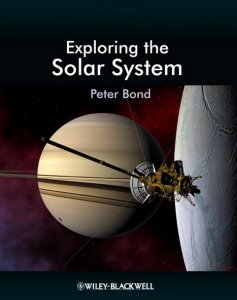 The exploration of our solar system is one of humanity’s greatest scientific achievements. The last half century has seen huge steps forward in our understanding of the planets, the sun, and the countless other objects in the solar system. Some would say that planetary science is a mature discipline — involving geoscientists, astronomers, physicists, chemists and others, we have in fact barely set foot into our exploration of our heavenly neighbours. Drawing on the latest observations, Peter Bond gives us an authoritative and timely account of these “uncharted backwaters of the unfashionable end of the western spiral arm of the Galaxy.” – Exploring the Solar System
The exploration of our solar system is one of humanity’s greatest scientific achievements. The last half century has seen huge steps forward in our understanding of the planets, the sun, and the countless other objects in the solar system. Some would say that planetary science is a mature discipline — involving geoscientists, astronomers, physicists, chemists and others, we have in fact barely set foot into our exploration of our heavenly neighbours. Drawing on the latest observations, Peter Bond gives us an authoritative and timely account of these “uncharted backwaters of the unfashionable end of the western spiral arm of the Galaxy.” – Exploring the Solar System
Although more than three centuries old, the five-night garden dialogues between Bernard de Fontenelle (1657-1757) and Aphra Behn (1640-1689) remain a painless way to learn about the sun, the moon, the planets and the stars, even though new planets were later discovered and modern science has filled out many details Fontenelle could not have known. This is no lecture, but a conversation with the cut and thrust of intelligent argument as the Marchioness challenges each of the astronomer’s assertions and requires him to explain the evidence. – A Discovery of New Worlds.
Bruce Schneir’s Liars & OUtliers takes a close look at trust. When we think about trust, we usually consider our personal relationships or perhaps our bank safety deposit box in Switzerland. But, trust is much wider than than. In fact, society only works with trust. It underpins communities, commerce, democracy – everything. Internationally renowned security technologist Bruce Schneier looks at the human side of tech and weaves together ideas from across the social and biological sciences to explain how society induces trust. He shows how trust works and fails and explains how in today’s wonderfully connected world, understanding the mechanisms of trust is as important as understanding electricity was a century ago. – Liars and Outliers: Enabling the Trust That Society Needs to Thrive.
Modern humans spend upwards of 11 hours out of every 24 in a state of constant consumption. Not eating, but gorging on information ceaselessly spewed from screens, monitors, speakers and earbuds. Just as many people have grown morbidly obese on sugar and fat and a lack of bodily movement, so, too, have we become (apparently) gluttons for texts, instant messages, emails, newsfeeds, app downloads, viral videos, Facebook status updates, and tweets. Author Clay Johnson seems to imply that this is something new. The technology aside, I am not so sure, we have always been social animals, we thrive on gossip, from the time we were chattering in the trees to the branches of a social network. I certainly agree that we should take control of our consumption but only so that we can gain the most benefit from it. – The Information Diet: A Case for Conscious Consumption